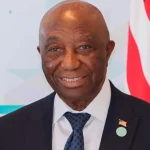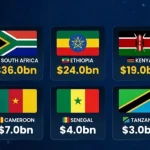Corroborating the speculation about the ban on crypto exchanges earlier on Tuesday, the Central Bank of Nigeria, in conjunction with the Nigerian Communications Commission (NCC) has directed all telecommunications companies in the country to restrict access to crypto companies’ websites and applications. This is part of the government’s desperate efforts to stem the freefall of the national currency, the naira.
On Wednesday evening, there were confirmations that websites of crypto exchanges like Binance, Kraken, Coinbase, OctaFX and others were no longer accessible for Nigerian users but many users still had access to applications, Binance specifically.
However, in the early hours of Thursday, we can confirm that the application of the crypto exchange, Binance, is no longer accessible using Nigerian Telecoms like MTN, Glo and Airtel, except for users using Starlink.
According to reports, Nigerian authorities are making this move to avert what it sees as continuous manipulation of the FX market, as part of efforts to avert the free fall of the local currency. Following reports that speculators use p2p marketplaces to significantly weaken the naira, the government decided to move against Binance and other crypto firms.
Recall that on Wednesday, the Special Adviser to the President on Information and Strategy, Bayo Onanuga urged the Central Bank of Nigeria (CBN) and the Economic and Financial Crimes Commission (EFCC) to clamp down on online platforms like Binance and other cryptocurrency companies for alleged manipulation of the foreign exchange market.
In a statement issued on X (Twitter), Bayo said Binance blatantly sets exchange rates for Nigeria and hijacks CBN role, adding that it is a platform that suffers access limitations from multiple jurisdictions, such as the US, Singapore, Canada, and the UK. According to him, crypto services like Binance and Kucoin ought to be prohibited from Nigeria’s cyberspace.
A backstory of crypto regulation in Nigeria
In February 2021, at the onset of the last bull run, the Central Bank of Nigeria (CBN) threw a regulatory curveball at the nation’s crypto enthusiasts by imposing a ban on transactions between banks, crypto exchanges and individuals.
The decision to impose the ban in 2021 stemmed from the Central Bank’s concerns over the potential risks associated with crypto transactions.
However, in December 2023, after almost three years of enforcing a comprehensive crypto ban on banks engaging with digital currencies, the CBN finally lifted its restrictions on Nigerian banks facilitating cryptocurrency transactions.
In a circular sent to banks on December 22, 2023, the CBN recognised that the increasing global demand and adoption of crypto make it unjustifiable to maintain the stringent restrictions imposed on financial institutions in 2021.
The lift of the February 2021 embargo marked a pivotal moment for Nigerian crypto enthusiasts, signalling a recognition of the evolving landscape and the need to strike a balance between regulation and innovation.
With the barrier removed, Nigerian crypto users could once again seamlessly transact through their bank accounts, bringing a sense of normalcy back to the burgeoning Nigerian crypto market.
But unfortunately, that excitement for endless possibilities in the Nigerian crypto industry is now short-lived as another embargo has been placed on crypto, exactly three years after the February 2021 episode.
Just that this time around, it is more severe as all access to crypto exchanges through local networks has been shut down as against the February 2021 restriction on banks’ interaction with crypto exchanges.
Are crypto P2P exchanges the cause of the naira fall?
Many think pieces are flying around the connection of trading of digital assets on p2p marketplaces and the fall of the Nigerian local currency.
In a statement made available to Technext, Nathaniel Luz, CEO of Flincap said every good relationship is built on mutual trust and a shared understanding.
“However, it seems like the government of Nigeria is not interested in having a good relationship with the people in the crypto space.”
According to Nathaniel, this ‘finger-pointing’ by the Nigerian authorities is in no way correct, as OTC traders cannot be blamed for the current value of the naira in the market.
“The crypto industry has not played any part in the current failing state of the economy and the fall of the naira.”
Nathaniel Luz draws a connection between this development and how the previous CBN governor went against abokiFx and other FinTech startups. According to him, People have lost confidence in the naira, and these actions are not helping to build the people’s confidence.
“It is more of a trust issue. People don’t trust the government’s actions, and people don’t trust the naira. What the government should be doing right now is trying to build and buy back this trust, not worsen the situation.”













